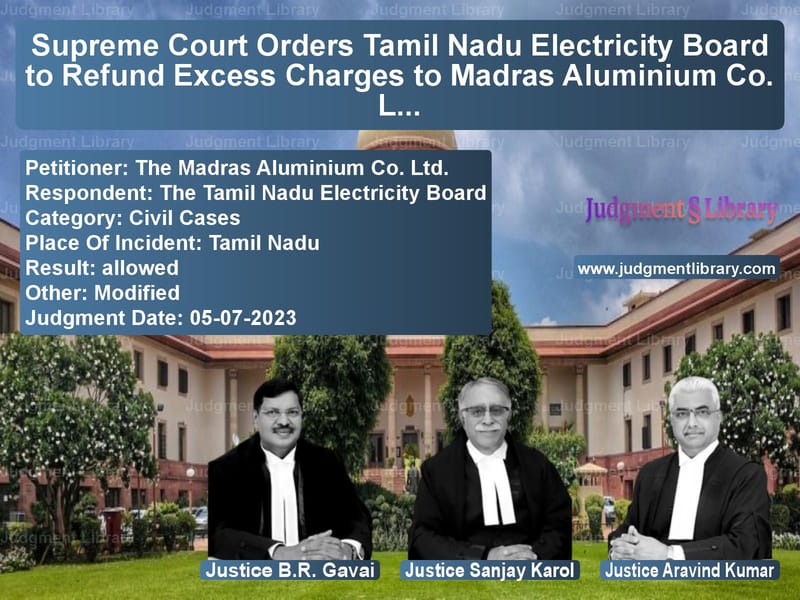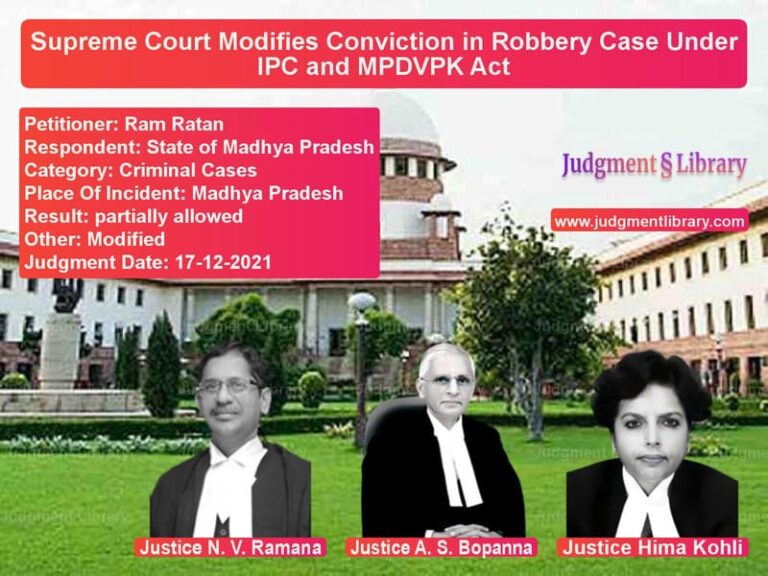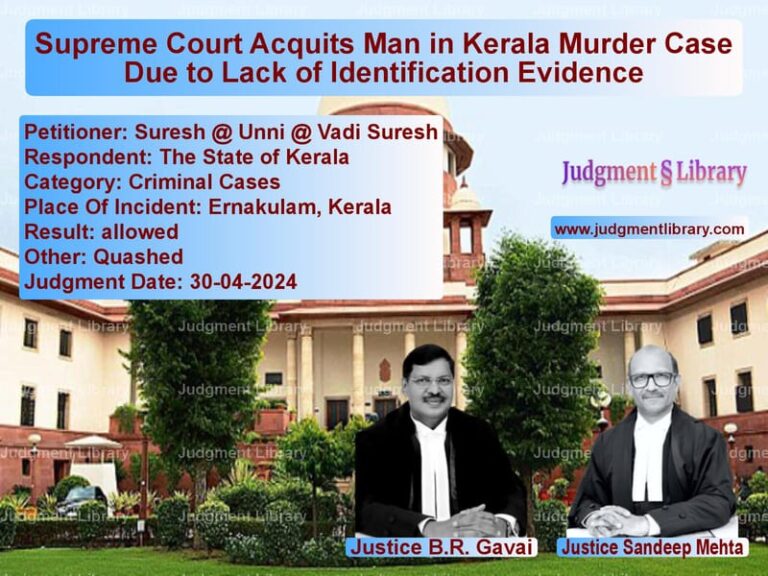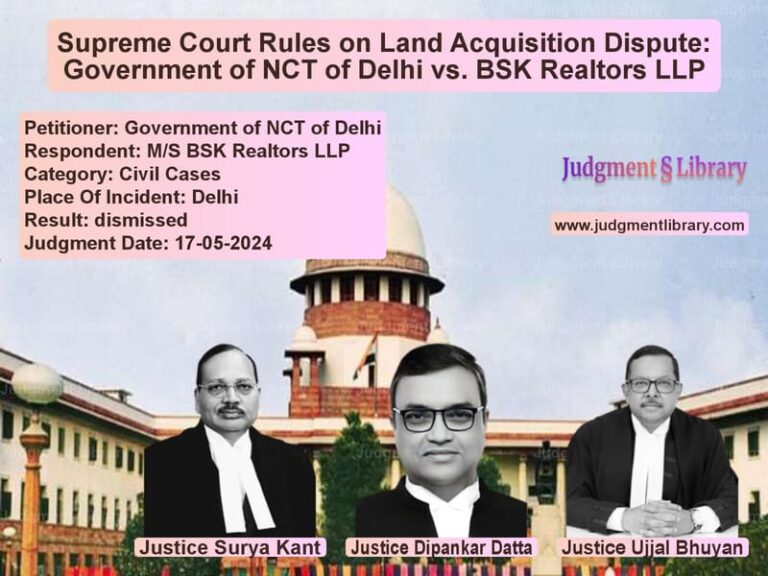Supreme Court Orders Tamil Nadu Electricity Board to Refund Excess Charges to Madras Aluminium Co. Ltd.
The case of The Madras Aluminium Co. Ltd. v. Tamil Nadu Electricity Board revolves around an industrial electricity tariff dispute. The Supreme Court ruled in favor of the appellant, ordering the Tamil Nadu Electricity Board (TNEB) to refund excess charges paid by the company due to delays in processing their request for a reduced electricity demand.
Background of the Case
The appellant, Madras Aluminium Co. Ltd. (MALCO), was a power-intensive industry that initially had a contracted maximum electricity demand of 67,000 KVA. Over time, due to operational changes, it sought reductions in its contracted demand. In 1999, the demand was reduced to 23,000 KVA. Subsequently, in 2001, MALCO applied for a further reduction to 10,000 KVA, but the request was delayed by over two and a half years, leading to financial losses.
Key Developments Leading to Litigation
- 1965: MALCO was established for aluminum production.
- 1987: Declared a ‘sick industrial unit’ under the Sick Industrial Companies Act, 1985.
- 1994-95: New management revived the company with concessions.
- 1999: Contracted electricity demand was reduced to 23,000 KVA.
- December 24, 2001: MALCO applied for a further reduction to 10,000 KVA.
- 2002-2004: Despite repeated requests, TNEB delayed action.
- July 2004: New agreement executed, officially reducing demand to 10,000 KVA.
- 2008: The Madras High Court ruled in favor of TNEB, dismissing MALCO’s claims.
- July 6, 2023: The Supreme Court overturned the High Court ruling and ordered a refund.
Arguments Before the Supreme Court
Appellant’s Arguments (Madras Aluminium Co. Ltd.)
The appellant contended:
- It had applied for a reduction in demand in December 2001, but TNEB unreasonably delayed processing the request.
- Despite repeated follow-ups, no decision was taken until July 2004.
- As a result, MALCO was forced to pay charges for 23,000 KVA despite using only 10,000 KVA.
- The delay caused financial hardship, violating the principle of fairness in contractual dealings.
- Other similarly situated consumers had their requests processed promptly, making the delay discriminatory.
Respondent’s Arguments (Tamil Nadu Electricity Board)
TNEB argued:
- The terms of the contract required that MALCO pay for the agreed demand until a new agreement was executed.
- The Board had the discretion to approve or reject such requests, and processing time depended on internal procedures.
- The High Court correctly ruled that MALCO could not unilaterally pay reduced charges without TNEB’s approval.
- The delay was justified given the complexity of power distribution and policy considerations.
Supreme Court’s Analysis and Judgment
A bench comprising Justices B.R. Gavai, Sanjay Karol, and Aravind Kumar ruled in favor of MALCO, holding that the delay was arbitrary and unjustified.
Key Observations of the Court
1. Delay in Processing the Request Was Unreasonable
“No reason whatsoever is forthcoming as to why this particular application required such a vast length of time to be acted upon.”
The Court found no justification for TNEB’s delay of over two and a half years.
2. State Entities Must Act Fairly and Transparently
“The State, while exercising its powers and discharging its functions, acts indubitably for public good and in public interest.”
The Court emphasized that public authorities must act with efficiency and fairness.
3. MALCO’s Application Should Have Been Processed in a Reasonable Time
“A reasonable period for processing such a request should not exceed six months.”
The Court held that a six-month period would have been reasonable under the circumstances.
4. MALCO Was Entitled to a Refund
“For the period beyond six months from the date of application, the Board must refund the excess amount paid by the appellant.”
The Court ordered TNEB to refund the difference paid for the excess demand beyond six months.
Final Verdict
The Supreme Court allowed the appeal, stating:
“The judgment of the Madras High Court dated 15th December 2008 is set aside. The Tamil Nadu Electricity Board is directed to refund the excess amount paid by the appellant for the period beyond six months from the date of application.”
The refund will be calculated from June 23, 2002, to July 1, 2004, with a simple interest of 6% per annum.
Impact of the Judgment
This ruling has significant legal implications:
- Reinforces fairness in state contracts: Public entities cannot delay contractual obligations arbitrarily.
- Sets a precedent for electricity disputes: Consumers have a right to timely decisions on demand reduction requests.
- Clarifies state liability: State entities must compensate consumers for financial losses due to administrative delays.
- Limits unilateral contract enforcement: Power boards cannot insist on payment for unused electricity without justifiable reasons.
Conclusion
The Supreme Court’s decision in Madras Aluminium Co. Ltd. v. Tamil Nadu Electricity Board upholds fairness in state-controlled electricity supply agreements. By ordering a refund, the ruling ensures that consumers are not unfairly burdened due to bureaucratic inefficiencies.
Petitioner Name: The Madras Aluminium Co. Ltd..Respondent Name: The Tamil Nadu Electricity Board.Judgment By: Justice B.R. Gavai, Justice Sanjay Karol, Justice Aravind Kumar.Place Of Incident: Tamil Nadu.Judgment Date: 05-07-2023.
Don’t miss out on the full details! Download the complete judgment in PDF format below and gain valuable insights instantly!
Download Judgment: the-madras-aluminium-vs-the-tamil-nadu-elect-supreme-court-of-india-judgment-dated-05-07-2023.pdf
Directly Download Judgment: Directly download this Judgment
See all petitions in Contract Disputes
See all petitions in Damages and Compensation
See all petitions in Public Sector Employees
See all petitions in Judgment by B R Gavai
See all petitions in Judgment by Sanjay Karol
See all petitions in Judgment by Aravind Kumar
See all petitions in allowed
See all petitions in Modified
See all petitions in supreme court of India judgments July 2023
See all petitions in 2023 judgments
See all posts in Civil Cases Category
See all allowed petitions in Civil Cases Category
See all Dismissed petitions in Civil Cases Category
See all partially allowed petitions in Civil Cases Category







